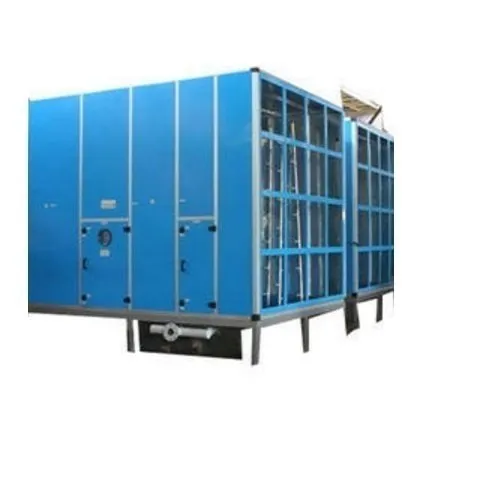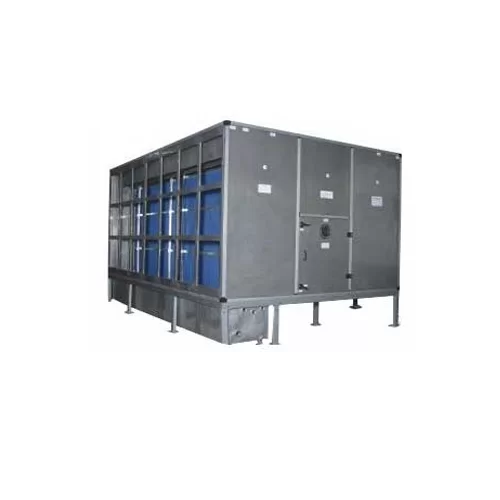Air Washer Manufacturer
Home / Products / Air Cooling System / Air Washer Manufacturer
Air Washer Manufacturer
An air washer, also known as an air scrubber or air cleaning system, is a device used to improve indoor air quality by removing pollutants, particles, and contaminants from the air. It works by combining the principles of water scrubbing and air filtration to effectively clean and humidify the air in indoor environments. Here’s how it functions and its construction:
Features
- Air Filtration: The air washer draws in ambient air from the indoor environment through a series of filters. These filters capture larger particles such as dust, pollen, and pet dander, preventing them from entering the air washer system.
- Humidification: The filtered air is then passed through a water reservoir or humidification chamber. In this chamber, water is circulated and dispersed into the air, adding moisture to the dry indoor air. This process helps to improve humidity levels, which is especially beneficial in dry climates or during the winter months when indoor air can become excessively dry.
- Air Washing: As the air passes through the water reservoir, any remaining airborne particles and pollutants are trapped and absorbed by the water droplets. This process effectively removes smaller particles, such as smoke, odors, bacteria, and viruses, from the air, leaving behind cleaner and fresher indoor air.
- Evaporation and Discharge: After passing through the water reservoir, the cleaned and humidified air is released back into the indoor environment. Any excess water that accumulates in the reservoir is evaporated or discharged through a drainage system to prevent the growth of mold or bacteria.
Construction of Air Washer Manufacturer
- Filter System: Air washers typically feature a multi-stage filtration system consisting of pre-filters, electrostatic filters, and/or HEPA (High-Efficiency Particulate Air) filters. These filters capture and remove larger particles and allergens from the air before it enters the humidification chamber.
- Water Reservoir: The water reservoir is a key component of the air washer where water is stored and circulated. It may contain features such as rotating discs, pads, or wicks to maximize the surface area of water exposed to the passing air, enhancing the efficiency of particle removal and humidification.
- Pump and Fan: Air washers are equipped with a pump to circulate water through the system and a fan to draw air into the unit and distribute the cleaned and humidified air back into the indoor space.
- Controls: Modern air washers often come with built-in controls and sensors to monitor and adjust parameters such as humidity levels, fan speed, and water flow, allowing for precise control over indoor air quality.
Applications of Air Washer Manufacturer
Air washers find applications in various settings where improving indoor air quality and maintaining optimal humidity levels are important. Some common applications include:
- Residential Use: Air washers are used in homes to remove allergens, dust, pet dander, and other pollutants from the indoor air. They also help to maintain comfortable humidity levels, especially during dry seasons or in arid climates.
- Commercial Buildings: Offices, schools, hospitals, hotels, and other commercial buildings benefit from air washers to create a healthier and more comfortable indoor environment for occupants. They can help reduce the spread of airborne illnesses, improve productivity, and enhance overall well-being.
- Industrial Settings: Certain industrial processes produce airborne pollutants and contaminants that can affect indoor air quality. Air washers are used in industrial facilities such as manufacturing plants, warehouses, and cleanrooms to remove particulates, fumes, and odors from the air, ensuring a safe and clean working environment for employees.
- Healthcare Facilities: Hospitals, clinics, and healthcare facilities use air washers to maintain clean and sterile environments, reducing the risk of cross-contamination and airborne infections. Air washers with HEPA filters are especially valuable in healthcare settings where high levels of cleanliness and air quality are essential.
- Laboratories: Research laboratories and pharmaceutical facilities require precise control over air quality to protect sensitive experiments, equipment, and products from contamination. Air washers help to remove airborne particles, microbes, and volatile compounds, maintaining clean and controlled laboratory environments.
- Data Centers: Data centers rely on air washers to remove dust and particulates from the air, preventing them from accumulating on sensitive electronic equipment and causing overheating or malfunctions. Maintaining clean air also helps to improve the efficiency and reliability of data center operations.
- Museums and Archives: Cultural institutions such as museums, galleries, and archives use air washers to preserve valuable artifacts, documents, and artworks by controlling humidity levels and minimizing airborne pollutants that could cause deterioration or damage.
- Food Processing and Storage: Air washers are employed in food processing facilities, cold storage warehouses, and distribution centers to maintain clean and hygienic environments, preventing contamination and preserving the quality and safety of food products.


